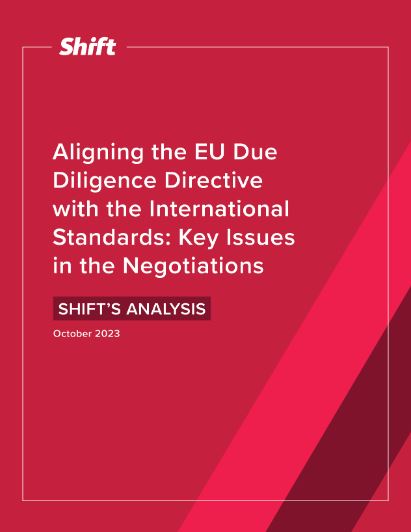Responsible corporate security practices: at the core of sustainable development
Geneva Centre for Security Sector Governance (DCAF) and International Committee of the Red Cross (ICRC)
This guest blog has been authored by the Geneva Centre for Security Sector Governance (DCAF) and the International Committee of the Red Cross (ICRC). It forms part of a webinar on Responsible Corporate Security Practices: A Must in High-Risk Environments that WBCSD is hosting for its member companies on 6 May 14:00-15:00 CEST.
Almost all companies employ some form of private or public security services to ensure smooth business operations in their value chains, regardless of industry sector or geographic scope. Yet business and security arrangements in fragile and conflict affected areas present particular challenges in implementing a responsible business strategy. The COVID-19 context has only complicated this situation further.
Security forces can significantly affect the foundation of peace, justice, and strong institutions. This raises the stakes for businesses to critically assess, mitigate, and remedy the potential human rights impacts of any security arrangements made by them or on their behalf.
WBCSD companies from around the world are leading the way in taking up WBCSD’s Call to action for business leadership on human rights and walking the talk in developing and implementing strong corporate human rights policies. In following the roadmap provided by the UN Guiding Principles on Business and Human Rights, however, companies might still need to look more closely at security challenges at the heart of human rights protections.
Beyond the UNGPs: The Voluntary Principles & the International Code of Conduct
Two lesser known, but equally important, international standards complement the UNGPs by focusing on business and security concerns and highlighting the importance of responsible corporate security practices. The Voluntary Principles on Security and Human Rights (VPs) set targets for corporate security practices to respect human rights. They also establish multi-stakeholder forums in which companies, governments, and civil society can collaborate to bring the principles to life through collaborative action on the ground. With a specific focus on private security, the International Code of Conduct for Private Security Service Providers sets standards that companies can measure their policies and practices against, and even obtain certification of their implementation.
To date, however, only a limited group of companies follow these specialized business and security standards. Given the fundamental role that security arrangements play in guaranteeing business continuity, more needs to be done to ensure that all companies in all sectors, as well as investors, take action to ensure the respect for responsible corporate security practices at the core of realizing the sustainable development goals.
How Companies and Investors Can Act
All companies committed to human rights must analyze where security arrangements in their value and supply chains might have negative human rights impacts. Companies can take concrete steps to address security and human rights concerns by:
- Integrating business and security guidance into company human rights policies and procedures such as risk assessments and business and security trainings to support responsible conduct of security providers attached to company operations.
- Applying the recommendations and good practices found in relevant multi-stakeholder initiatives such as the Voluntary Principles on Security and Human Rights and the International Code of Conduct for Private Security Providers Association (ICoCA). When relevant, companies should join these initiatives.
- Engaging with in-country working groups and other processes on business, security and human rights, where community representatives, civil society, national actors and other industry colleagues come together to jointly address security and human rights challenges in mining operations.
Investors are encouraged to develop indicators that highlight where security arrangements affect the ability of companies to respect human rights and guarantee responsible supply chains.
The security aspects of business and human rights are complex. That’s why the Geneva Centre for Security Sector Governance (DCAF) and the International Committee of the Red Cross (ICRC) stand ready to help companies, policymakers, and investors get to know business and security best practices and implement them in practical terms.
The DCAF – ICRC Partnership: Helping Companies Address Business, Security, and Human Rights
The Geneva Centre for Security Sector Governance (DCAF) and the International Committee of the Red Cross (ICRC) have been partnering since 2012 to help companies practice responsible business conduct. Our Knowledge Hub centralizes resources on business and security. Our DCAF-ICRC Toolkit is a practical tool that helps companies recognize business and security challenges and provides good practice recommendations, illustrated by case studies, on what companies can do to ensure their security services respect human rights.
DCAF and ICRC also provide on-the-ground advice to companies and other stakeholders in countries such as the Democratic Republic of Congo, Kenya, Nigeria, Peru, and elsewhere. We support working groups in which company, government, and community actors work together to address the increased vulnerability of local communities, reducing social tensions and ensuring human rights compliant security practices around company operations.
Please feel free to contact DCAF/ICRC with any questions you might have on how your company can ensure your security services protect human rights.
![]()
Copyright © 2021
World Business Council
for Sustainable Development
All rights reserved
Privacy Policy
Follow us
Contact
MAISON DE LA PAIX
Chemin Eugène-Rigot, 2B
Case Postale 2075
CH-1211, Geneva 1
Switzerland
Tel: +41 (22) 839 3100
Fax: +41 (22) 839 3131


